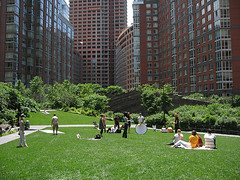Green Metropolis: David Owen’s urban manifesto

Posted September 29, 2009 at 1:31PM
I've written before about how rural utopias usually aren't as environmentally benign as they seem, while urban places - compact, walkable cities, suburbs, and towns - encourage lifestyles that are very low-impact on a per-capita basis. It's one of the basic premises of smart growth. David Owen, author of the new book Green Metropolis, understands this and believes the message must be spread.
 I was asked to write a review of Green Metropolis for Solutions, a new academic journal dedicated to "solving the mounting environmental, social and economic problems of our time." (Note: the website is only partially constructed.) Excerpted from my full review, here's some of what I have to say:
I was asked to write a review of Green Metropolis for Solutions, a new academic journal dedicated to "solving the mounting environmental, social and economic problems of our time." (Note: the website is only partially constructed.) Excerpted from my full review, here's some of what I have to say:
"Owen's 2004 article, 'Green Manhattan,' published in the New Yorker, was a breath of fresh air for those of us working on urban issues and sustainable alternatives to suburban sprawl. In 'Green Manhattan,' Owen made the point that when we measure environmental impacts, whether emissions, waste, or land consumption, on a per capita basis, dense cities are, in fact, the greenest places and, in the US, Manhattan is the greenest of them all. In his article, Owen clearly articulated what some of our new work at the NRDC was all about: reducing our per capita environmental footprint by finding more efficient ways to grow.
"But Owen was also right in that article to assert, as he does again in his new book, that a lot of environmentalists and a lot of the public still do not understand this sort of environmental calculation. When 'Green Manhattan' was published, I sent a copy to all of my organization's trustees, and, to my dismay, within an hour of my message, one of my colleagues had fired off a rebuttal. My colleague, who was invested in addressing problems of urban waste and pollution in New York, was not entirely wrong in fearing that Owen - and, by extension, I - were undermining his work by suggesting that Manhattan was environmentally OK the way it was.
But he was wrong in failing to acknowledge that, in many ways, Manhattan was and remains a very good environmental model, with its highly efficient use of land and walkable neighborhoods. And that, if we could bring the per capita environmental footprint of America closer to that of Manhattan, we would be achieving a great green success . . .
"Green Metropolis, which expands on the themes Owen introduced in 'Green Manhattan,' could not be timelier. The book is subtitled 'What the city can teach the country about sustainability,' and there is indeed a critical story to be told on the subject. Increasingly, planners and policy wonks get it, but the public, who elect our decision-makers and testify at development hearings, do not, and we need someone like Owen to help spread the word, in non-wonky English.
"To a great extent, Owen accomplishes this. Especially in his well-researched opening chapter, Owen shows how environmentally efficient a large city like New York really is, and how failing to seize upon this fundamental truth can lead us in wrong directions.
He is absolutely right, for example, in pointing out that the biggest environmental challenge facing a place like New York is not, as many believe, how to reduce carbon emissions from lighting, heating and cooling buildings, a category in which New Yorkers already lead the nation on a per capita basis (like 'putting skinny people on diets,' Owen writes). It is, instead, how to address perceptions of inferior public school quality and a lack of public safety, which diminish the city's ability to attract and retain residents to its efficient lifestyle . . ."
The book contains useful chapters on transportation, parks, the inherent energy efficiency of buildings in urban locations, whether or not they employ the latest green technology, and so on. Each is filled with information and interesting anecdotes, and Green Metropolis makes a good introduction to and overview of these subjects from the point of view of an urbanist. I would recommend it especially to someone newly interested in these subjects as a good place to start.
I do think the book has some flaws, unfortunately, including one very important one. But you'll have to read my full review to know what it is.